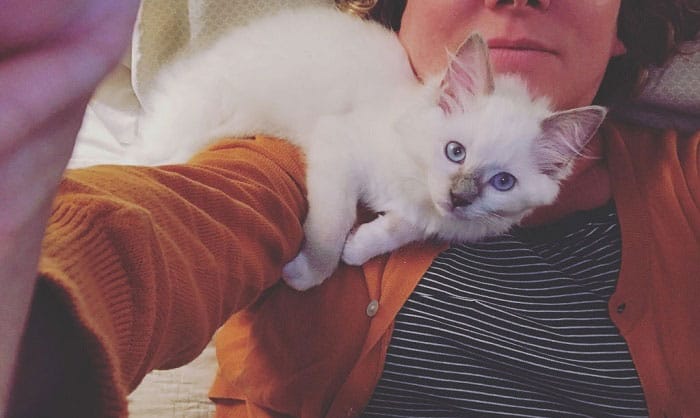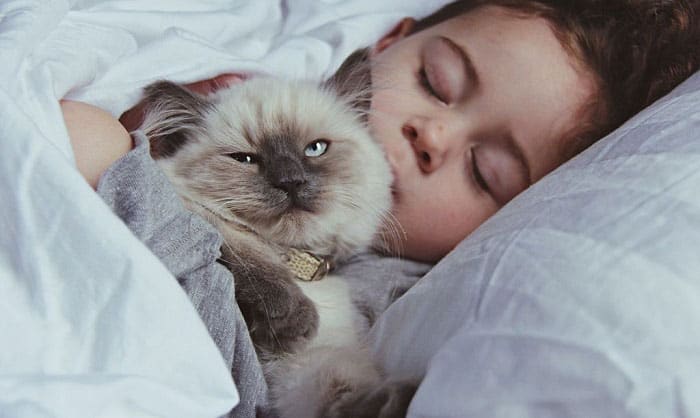Many cat owners may have purchased a cozy bed for their feline companions. While the cat does not sleep on it, she sometimes rests on her owner’s neck. If you own a cat, you may be familiar with this scenario and are stuck with the puzzling question, “why does my cat sleep on my neck?”
There are a few explanations behind it. Let’s find out what the cause is if you don’t already know! It’ll help you understand your pets better.
Table of Contents
Why Does My Cat Lay on My Neck at Night?
1. They Want to Get Warm
Cats prefer to sleep in a warm environment, and they’ll follow a sunbeam around the home all day to nap in its warmth. Your head and neck may be exposed while you sleep under the blanket at night, and because the head emits most of your body heat, it is an ideal heater for a cat snuggling under your chin.
2. Feel safe
As their owner, your kitten will frequently look to you when they’re not feeling well, or when things are uncertain. Your cats will feel comfortable and secure if they sleep on your body. Kittens who snuggle up to a human neck may feel the carotid artery pulsating, providing the same sensation of security they experienced in the womb.
3. They like your sound and your breath
Many animals, including cats, find some sounds and rhythms of breathing relaxing. Cats enjoy our fragrance, breathing, and other noises that we make. Therefore, it doesn’t come as a surprise that a cat lay on my neck for comfort.
4. They’re Stressed and Alone
If you go to work or school every day, your cat may miss you while you’re gone. Separation anxiety might be the cause of your cat being unhappy or showing signs of suffering while you’re gone.
If he has separation anxiety, he’ll want to be with you all the time when you’re at home, which is likely the reason you’re wondering why my cat sit on my neck. Because your neck is the only area he can access while you’re sleeping, he’ll want to spend his time there.
5. Making their mark
Head-butting and whisker-stroking are common ways for cats to mark their territory, dispersing their smell from glands on their heads, cheeks, paws, and other regions.
You can’t detect a cat’s fragrance, but your cat is marking you as part of his territory when he rubs his face on you. While sleeping close to your face, he may be ensuring that you bear his mark as much as he is enjoying quality time with you.
6. They Like You
Although this may seem self-evident, it should be mentioned that if your cat, or any feline for that matter, is lying on top of you, they may be fond of you. Cats, like humans, appreciate the sensation of having a loved one close, and that loved one is you. Often, simply being near their person is enough to make a cat feel safe and pleased.
If you’ve recently taken a kitten home, adopted an older cat, or are cat-sitting for a friend, this may be a massive badge of pride.
7. Being Dominant
If you have many cats, the most dominating one will most likely sleep higher up, while the lowest-ranking cat would probably sleep closer to the ground.
When you sleep on your face, the top cat is at the highest place on the bed, ideal for keeping an eye on the owner. Your more submissive feline will most likely sleep at the foot of the bed or on her cat bed in the room’s corner. If you pay attention, you will notice this and be able to answer “why my kitten sleep on my neck.”
Furthermore, check this article to know why cats sleep on you and how many hours your cats sleep a day!
Is Sleeping with Cats Harmful?
If your cat is clean and well-cared for, it is typically safe to sleep with them. Dirt and parasites picked up by your cat outside, on the other hand, might be transmitted to the linens and pillows.
As a result, you should only allow your cat to lie on the outside of your blankets to protect your blankets’ interior. If you don’t want your cat to sleep on your bedding at all, cover that area with a sheet or a spare blanket for extra protection.
What Do You Do When a Cat Sleeps on Your Neck?
If you’re thinking “is it bad that my cat nuzzle my neck?” it is advisable to:
- Check to see whether the body of a cat is hampering your breathing.
- Ensure you’re safe and that the cat’s body isn’t too heavy for your neck and head.
- It’s OK to let the cat sleep on your pillow once you’ve assessed the situation and determined that you’re safe.
- Determine if it is a regular occurrence.
- If you suspect something is wrong with your cat and the behavior is out of the ordinary, you should take your cat to a veterinarian.
How to Get Your Cat Out of Your Neck?
There are a few ways you may encourage your cat to scram at bedtime if you don’t want them to sleep with you every night. Begin by simply instructing your cat to leave your bed before you retire for the night. If that doesn’t work, try one of the following:
- Change the location of the cat bed. Move the cat bed farther from your bed and make it have the same feeling as yours. Ideally, your cat would sleep in their bed and feel like they are sleeping in yours.
- Close your door. Closing your bedroom door will keep your cat away from your bed at night. For the first few nights, your pet may meow and yowl, but patience and persistence on your side should help your cat adapt to its new nocturnal environment.
- Make a bedtime buddy for your kitten. Give your cat a new fluffy bedtime companion to snuggle with on his bed. With any luck, the warmth, friendship, and security it provides will satisfy him.
One or more of these alternatives may work for you and your cat, so give them all a try before deciding which is best for your home.
Final Thought
Many individuals do not mind sleeping alongside their pets. However, not all cat owners feel the same. Hopefully, the information we’ve provided here will assist you in understanding “why does my cat sleep on my neck” and what you can do about it if you don’t like it.
That said, if you still have questions after reading the article, an animal behaviorist should be able to help.

I am Amy Sawy, a Doctor of Veterinary Medicine (DVM) graduate from the University of Kansas. y husband, Dr. Plummer, and I own a veterinary clinic in Phillipsburg, Kansas. In addition to my professional background, I am a devoted pet owner myself, with a household that includes dogs, rodents, and most notably, cats – a total of five felines in my home.
In 2020, I joined an organization as a professional writer, leveraging my experience and collaborating with my team to deliver the most valuable information for your cat’s care.












